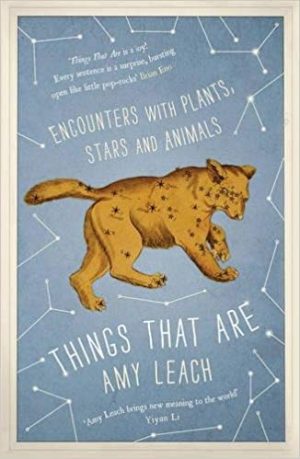A collection of twenty-six essays like nothing you’ve ever seen before, Things that Are by Amy Leach manages to bring together seemingly opposed ways of approaching the natural world in a brilliant, moving, and hilarious victory. For the scientific and literary alike, for the philosopher and the poet in your life—or in your soul—this collection is a must-read.
Leach purports to centre each essay around a natural being or phenomenon, such as the eating habits of pandas, or the orbit of the moon, or the delicate nature of sea cucumbers. Invariably, however, she subverts the recognizable thesis-evidence structure of an essay, allowing her prose to meander, coming to extraordinary and delightful finales that seem to have nothing to do with their original theme. While reading you thus exist in a blissful state, having no idea at all what she is really explaining, but loving the journey. Leach wields her prose like a magic wand, gently introducing us to a world of delights—a world we may realize is already ours, if we would accept it.
In the wonderful essay ‘Pea Madness,’ for example, Leach explains the search of a pea plant’s feelers for a lattice. As she dutifully explains, ‘You can only look for so long before your looking apparatus topples you over.’ This wisdom is, just like the entire essay, entirely true for peas. And yet somehow it is entirely true for humans too. Throughout the book, Leach is never in danger of drawing the metaphor out, which would be far too obvious, and you are left with a strange sense of companionship with those neat green rows.
Ever gentle, ever generous, she subtly adopts different interpretations of the natural world, embracing a scientific epistemology one minute, the cosmology of Norse myths the next, and the point of view of the stars, all in the same tone of quirky, earnest explication, as if all of this wonder were obvious. Leach’s brilliantly inventive metaphors are similarly exhilarating in their stubborn lack of flair. She writes, for example, how ‘dandelions […] escape like secrets: sprawlingly.’
If the prose weren’t a delight in itself, the effect these techniques have is an exciting one. If you’ve ever been frustrated by what Kathleen Jamie in the London Review of Books calls “the lone enraptured male” of nature writing, that white middle-class man who exults in the natural world and then, in his writing, civilizes that landscape with his own over-educated lyricism, Leach may be the answer to your prayers. Refusing to take on one point of view, ever humble in her metaphors and imagery, Leach’s originality teaches us to pay attention to the personal—our—point of view, to cultivate a trust in it, and finally, to exult in it.
Things That Are by Amy Leach is published by Canongate, 208 pages.
If you enjoyed Things That Are, you might also like Shark Drunk by Morten Strøksnes.





